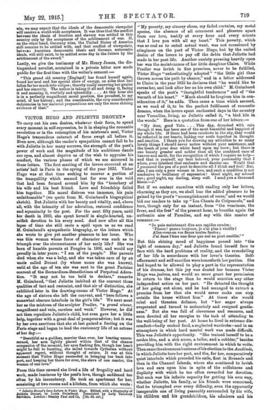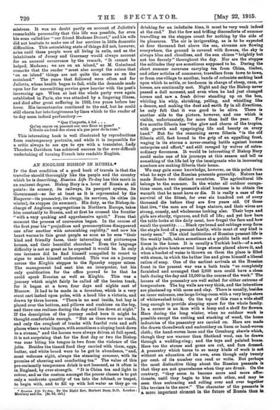VICTOR HUGO AND jIILIETTE DROIIET.e To carry out his own
desires, whatever their form, to spend every moment in self-expression, be it in shaping the romantic revolution or in the redemption of his mistress's soul, Victor Hugo's tremendous cataract of force swept all before it. Even now, although the reader's sympathies cannot fail to be with Juliette in her many sorrows, the strength of the poet's power of work and the magnitude of his ambitions dazzle our eyes, and almost deprive us of the wish to appraise his conduct, the various phases of which we see mirrored in these letters. The first meeting of the lovers occurred at an artiste' ball in Paris in the spring of the year 1832. Victor Hugo was at that time seeking to recover a portion of the tranquillity which seemed loot for ever in the void that had been formed around him by the "treachery of his wife and his best friend. Love and friendship failed him together. His moral distress was immense, his pain unfathomable" (we quote from M. Guimbaud's biographical sketch). But Juliette with her beauty and vitality, and, above all, with the intensity of her adoration, restored confidence and equanimity to the poet. For the next fifty years, until her death in 1883, she spent herself in single-hearted, un- selfish devotion to his every need. And now after all this lapse of time she still caste a spell upon us as we read M. Guimbaud's sympathetic biography, or the letters which she wrote to give yet another pleasure to her lover. Who was this woman whose force of character was such as to triumph over the circumstances of her early life P She was born of humble parents at Fenger° in 1806, and would say proudly in later years " I am of the people." Her parents died when she was a baby, and she was taken care of by an uncle called Drouet (by whose name she was known), until at the age of ten she was sent to the great Parisian convent of the Bernardines-Benedictines of Perpetual Adora- tion. "It may not be too bold to declare," remarks M. Guimbaud, "that Juliette imbibed at the convent those qualities of Mot and restraint, and that air of distinction, she exhibited later in the drawing-rooms of Victor Hugo." At the age of sixteen she left the convent, and "here follows a somewhat obscure interlude in the girl's life." We next meet her as the mistress of the sculptor Pradier, "a grand Memo, magnificent and vain, careless and weak." However, he did not then repudiate Juliette's child, but even gave her a little help, together with a great deal of pompous advice; but it was by her own exertions that she at last gained a footing on the Paris stage and began to lead the customary life of an actress of her day t- " Beautiful as a goddess, merrier than ever, her bearing unoon- eerned, her arm lightly placed within that of the chance companion of the moment, her eyes flashing fire, though her heart might be full to bursting, she sailed towards Cytherwa without apparent regret, without thought of return. It was at this moment that Victor Hugo succeeded in bringing her back into port, and keeping her there for ever, the slave of one master, the woman of one love," From this time onward she lived a life of frugality and hard work, made luminous by the poet's love, though saddened too often by his inconstancy. He took an apartment for her, consisting of two rooms and a kitchen, from which she wrote : • Joliette Dr000t's LoroL.ft.xs to Yktor Hap. Edited, with Biography of Joliette Drone; by Louie OnnobouL Tranelated by Lsdy Theora Davidson. LPIld011: Stanley raul and Co. [10a Od. net.] " My poverty, my clumsy shoes, my faded curtains, my metal spoons, the absence of all ornament and pleasure apart from our love, testify at every hour and every minute that I love you with all my heart." This poverty, which was so real as to entail actual want, was not occasioned by stinginess on the part of Victor lingo, but by the united desire of the lovers to pay off the debts that Juliette had made in her past life. Another anxiety pressing heavily upon her was the maintenance of her little daughter Claire. While Pradier was lavish in fine promises, never to be fulfilled, Victor Hugo "unhesitatingly adopted" "the little girl thus thrown across his path by chance," and in a letter addressed to Claire in the year 1833 he declares that "he would like to caress her, and look after her as his own child." M. Guimbaud speaks of the poet's "thoughtful tenderness" and of "the warmth of his heart," "Much should be forgiven him in con- sideration of it," he adds. Then came a time which seemed, as we read of it, to be the perfect fulfilment of romantic dreams, when the lovers spent enchanted days in the country near Versailles, living, as Juliette called it, "a bird life in the woods." Here is a quotation from one of her letters "My dear, good Tote.. . . This day, drenched with rain though it was, has been one of the most beautiful and happiest of my whole life. If there had beau rainbows in the sky, they would be reflected in our hearts, linking our souls together in thought and emotion. I thank you for drawing my attention to so many lovely things I should never notice without your assistance, and the touch of your dear white hand upon my brow ; but there is one beauty greater and nobler than all the combined once of heaven and earth, for the recognition of which I require no help— and that is yourself, my best beloved, year personality that I adore, your intellect that enchants and dazzles me. Would that I possessed the pea of a poet to describe all I think and foal! But, alas, I am only a poor woman in love, and such a condition is not conducive to brilliancy of expression! Good night, my adored one ; good night, my darling, sleep well. I send you a thousand kisses—J."
But if we content ourselves with reading only her letters, charming as they are, we shall lose the added pleasure to be gained by the poet's "accomplishment of verse," and we would bid our readers to take up "Lea Chants du Crdpuscule," and turn, though only for an instant, from "the weariness, the fever, and the fret" of the present hour, to breathe again the authentic airs of Paradise, and say with this master of romance
Is puts maintenant dire aux rapides annees
'Passes! passes teujours, je n'ai plus a vieillis1
Alley-vons-en vas flours tautest tastes ;
J'ai dana nine IMO flew quo nul no peat " But this shining mood of happiness passed into "the light of common day," and Juliette found herself face to face with the hard problems of reality, and the remodelling of her life in accordance with her lover's theories. Self- effacement and self-sacrifice were henceforth herportion. She had hoped to be allowed to play a part in the representation of hie dramas, but this joy was denied her because Victor Hugo was jealous, and would no more grant her permission
to return to the stage than ho would sanction any other independent action on her part. "He detested the thought
of her going out alone, and he had managed to extract a
promise from her that she would never make one step outside the house without bins." At times she would rebel and threaten defiance, but " her anger always evaporated and turned to melancholy and resigned gentle- ness." But she was full of cleverness and resource, and soon devoted all her energies to the task of attending to the well-being of her poet. At home he lived in extreme dis- comfort—badly cooked food, a neglected wardrobe—and in an
atmosphere in which bard mental work was made difficult.
This was Juliette's opportunity. "She trained herself to be a cordon bleu, and a sick nurse, a tailor, and a cobbler," besides
providing him with the right environment in which to write.
Then came the strenuous business of his election to the Academie, in which Juliette bore her part, and the, for her, comparatively
quiet interlude which preceded his exile, first in Brussels and
then in the Channel Islands, where she continued to lavish love and care upon him in spite of the selfishness and duplicity with which he too often rewarded her devotion.
But such was his infinite capacity for getting his own way, whether Juliette, his family, or his friends were concerned,
that he triumphed over every difficulty, even the apparently insuperable one of living peaceably surrounded by his wife, his children and his grandchildren, his admirers and his
mistress. It was no doubt partly on account of Juliette's remarkable personality that this life was possible, for even his eons called her "our friend Madame Drouet," and his wife did not hesitate to make use of her services in little domestic difficulties. This astonishing state of things did not, however, arise until these people were all living in exile, and as the inhabitants of Jersey and Guernsey would always account for an unusual occurrence by the remark, "It cannot be helped, Madame; we are on an island," so IL Guimbaud remarks that the reader " must also accept the axiom that ' on an island' things are not quite the same as on the mainland." The years that followed were often sad for Juliette, whose health began to fail, while the demands made upon her for unremitting service grew heavier with the poet's increasing age. When at last the whole party were again established in Paris, she was attacked by a lingering illness, and died after great suffering in 1883, two years before her lover. His inconstancies continued to the end, but he could still charm her into forgiveness by lines which to the reader of to-day seem indeed perfunctory
Que t'importe, it tel . . . Qletut rayon en peasant sue nee flour se pose P
L'dtoilo au fond des clean n'a pas pear de la rose."
This interesting book is well illustrated by reproductions from contemporary portraits, and while it is impossible for a critic always to see eye to eye with a translator, Lady Theodora Davidson has achieved success in the ever-difficult undertaking of turning French into readable English.



































 Previous page
Previous page